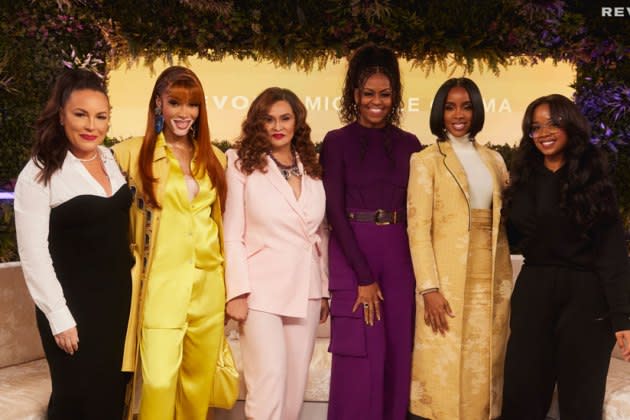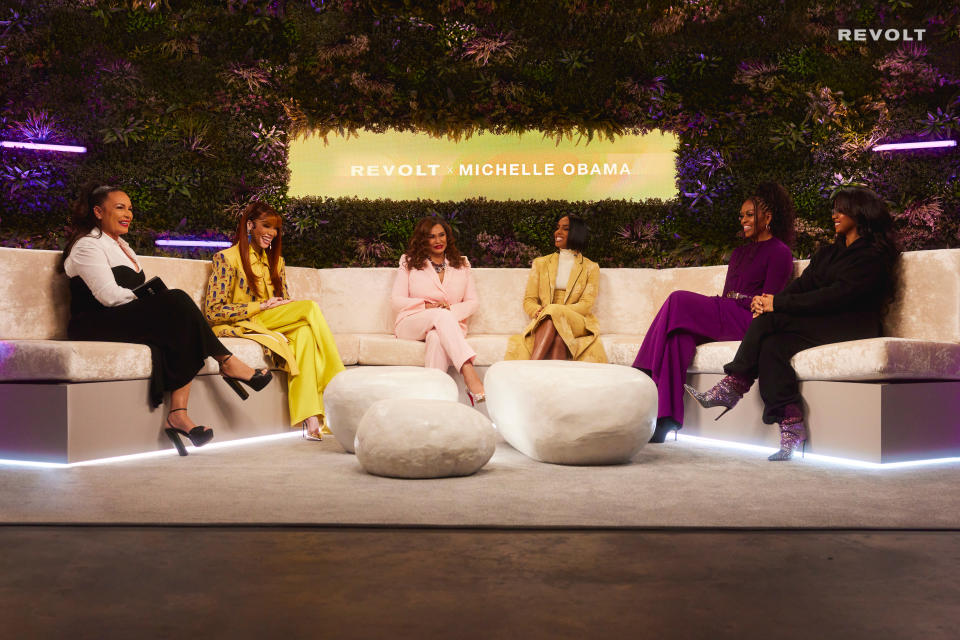How Revolt’s Michelle Obama Special Sets Up the Network’s Next Chapter
- Oops!Something went wrong.Please try again later.
- Oops!Something went wrong.Please try again later.

When former first lady Michelle Obama arrived at Revolt’s Atlanta headquarters to talk about her new book “The Light We Carry,” she walked into a unique situation.
Not only was Obama sitting down for a candid conversation with a quintet of powerful women of color — Grammy winners H.E.R. and Kelly Rowland, supermodel and activist Winnie Harlow and businesswoman Tina Knowles-Lawson, moderated by radio host Angie Martinez — but the studio was also filled with women of color — from the special’s executive producer Monique Chenault, Revolt’s president of news, specials and documentary, to the talent bookers, crew and PAs.
More from Variety
Needless to say, the vibe on set was markedly different than most.
“The fact that she thought it was so important to set aside some time to have this family talk with Black women in a safe space — where she could go, ‘Hey, this is what I’ve learned. This is what I want to tell y’all’ — is so representative of who she is,” Chenault tells Variety. “She knows the struggle of being a Black woman. She knows we have unique challenges and different hurdles. We’re just so honored that she decided to choose to sit down and have that conversation with us.”
The two-hour special, which aired Wednesday night on Revolt TV and its digital platforms (including the Revolt app and Youtube channel), was billed as an “unfitted, uncut and completely unapologetic cross-generational” discussion.
The round table interview marked a special spot on Obama’s national book tour where she was interviewed by an A-list lineup of journalists, talk show hosts, entrepreneurs and entertainers, including Tyler Perry, Gayle King, David Letterman, Tracee Ellis Ross and Oprah Winfrey.
“Our visit hits different,” the Revolt special’s opening narration proclaims.
And the conversation lived up to the hype, with plenty of free-flowing tears and laughter as Obama dropped gems about learning to conquer self-doubt and “ride that wave of fear,” the importance and power of Black fatherhood and her relationship with her own dad, among other topics.
“I know that she’s a national treasure, just in being herself, living in her own truth, but what she represents to Black women and women of culture is is exponentially more heartfelt,” Chenault says. “We realized in real time, not in hindsight, what she was doing is going to change how people see us.”
That’s why it was so important to engage Obama with a multi-generational group of women to discuss the evolution of Black womanhood. By congregating in the “living room” set, it’s like getting your girlfriends, aunties, mamas and grandmas all in one space. “It’s something that will be one of the most valuable things in our archives,” Chenault says.
The Michelle Obama special puts an exclamation point on Revolt’s 2022 mission to create more content aimed at Black women.
“Black women are such a critical piece to the fabric of Black culture — to all culture — so it’s beautiful to be able to facilitate those conversations and have them happen on our platform,” says Revolt CEO Detavio Samuels.
It’s been nearly 10 years since Sean “Diddy” Combs launched Revolt, a network rooted in hip-hop culture, which has since developed into a multimedia company that produces linear and digital long-form series and multi-platform short-form programming. Samuels wasn’t involved in the company from day one, but he distinctly remembers being intrigued by Combs’ initiative.
“It looked fresh and new and young and exciting,” he remembers.
Since joining the company as CEO in 2020, Revolt has expanded their slate — increasing their original series offerings from 26 to 42 in two years, with weekly programs like “Revolt Black News,” “Drink Champs” and “Kingdom Culture With T.D. Jakes” producing about 40 episodes a year. This year, Revolt also launched a podcast network with a roster of more than 30 series, as well as Revolt Mixtape, a new FAST channel for library programs and exclusives. At its inception in 2013, Revolt reached roughly 25 million households; today that number is roughly 80 million, with its digital reach exponentially greater.(Between January 2020 and November 2022, the digital audience has grown from 500,000 unique views per month to 5 million.)
One key factor in growing this audience has been Revolt’s ability to develop talent-first content partnerships with Yung Miami (“Caresha Please”), Killer Mike (“Love & Respect With Killer Mike”), Soulja Boy (“Soulja Boy Presents: The Life of Draco”) and more.
“Our strategy for content development is relatively simple,” Samuels says. “Where most people in TV tried to go find stories that they like and then they go find talent and try to plug that in, we do the opposite.”
It’s similar to the way things work in the music business, he says. “We’re searching for and curating the dopest entertainers and artists that we could find, people who have large audiences that can help us build a portfolio where we are representing Black people across the spectrum — men and women, younger and older, LGBTQ, etc. We want to represent and amplify the best voices of the culture that can help us move forward.”
The success of “Caresha Please” — which has netted some 25 million views over six episodes — is one example of Revolt’s innovative approach to producing content that allows the talent to present themselves unapologetically while delivering it to the audience in a way that creates buzz and brand awareness.
“There’s no appointment viewing — ‘Come watch Caresha every Thursday!’ We get the best episodes in the can, we announce it 24- to 48-hours before the show airs, and millions of people show up,” Samuels says. “We’re disrupting the way people have conventionally thought of as the way to play the TV game.”

Samuels’ theory is that due to the rise of on-demand viewing, audiences are no longer locking a movie or TV show premiere into their calendar months in advance, unless it’s a blockbuster tentpole like Marvel’s “Black Panther.”
“We are trying to get them in the moment,” he says. “It’s an effective way to capture their attention. This is the home for the biggest conversations that end up being so exciting that they’re trending, so it can also be a sense of FOMO. You don’t want to miss out.”
Those kinds of creative choices have helped Revolt enjoy longevity in a competitive marketplace, with an audience similar in size to Vice or Complex, and put it in a position of collaboration rather than competition with other Black-owned media entities like Urban One, Essence, Ebony and The Shade Room.
“We don’t see competition,” Samuels says. “When I talk about competition, we talk about Disney and Viacom. We’re trying to be a $100 billion corporation. We want those those types of resources to put into the creators in our world. That’s the bigness of the dream and the vision.”
As Revolt evolves its programming, there has been a conscious focus on covering matters of social justice and the socio-economic pressures people face in their day-to-day lives. Even the news operation moves differently, pivoting away from covering the 24-hour news cycle to instead focus on making impact with evergreen, investigative reporting.
“There’s a lot of advocacy mixed into our journalism, because we feel that Black communities are very much in a state of emergency, so we are always very precious and intentional about figuring out what do we need to tackle,” Chenault says.
One example is the upcoming special “The Real Thirst Trap,” a documentary which tackles the issues of water pollution in Black-majority communities.
“It is a crisis that people don’t know about. It’s not just Flint, Michigan, and it’s not just Jackson, Mississippi,” Chenault says. “We’re not on the ground, and we’re tracing this back to this terrible correlation of learning disabilities, anger, management, cancer, asthma because of pollution in the water.”
Revolt is in a rare position to tackle topics that are important to Black people because “our entire newsroom is the demographic,” Chenault says. “The news is outside our door. And it’s such a blessing that audience that you are targeting are the people that are creating and choosing the content and producing the show.”
With Revolt’s new headquarters in Atlanta, the company has a pipeline to the HBCU graduates and other young Black professionals who see the city as the capital of Black culture and progressiveness. In addition to becoming a top entertainment production hub, Atlanta also boasts more Black-owned businesses per capita than any other place in the country.
“It really fits our narrative and aligns with our mission for us to be here,” Chenault says. As a Black woman with nearly three-decades experience in the business, she says it makes her emotional to see so many young Black women following in her footsteps.
“I think we’re finally having a Black women’s renaissance. To see this next generation really being able to sit on the heels of all the work that my generation put in is just incredibly special. To look outside my door and see a line of young Black women waiting to come talk to me about their scripts or their pitches is priceless.”
A similar sentiment flows through the entire operation. As a Black-owned, -operated and -targeted brand, the company is focused on leveraging of its “unique credibility” in the culture.
“We’re not just observers of the culture, like most mainstream outlets,” Chenault says. “Our chairman [Combs] was part of the creation of it, and we’re steeped in it. So we do thing that are of the culture. We really have something to say — to translate for people, to help them understand.”
Thus, the content covers a diverse range of topics, from financial literacy, entrepreneurship and business (“Bet on Black,” “Assets Over Liabilities”) to faith-based programming (“Kingdom Culture with T.D. Jakes”), sports (“The Crew League” and Beyond the Court”) and fashion (“Rate ‘Em”).
In 2023, Samuels is laser-focused on the future and emphasizing Revolt’s position as a distribution company as the industry evolves into streaming.
“We know that our audience, that Black folks are streaming more than anybody else, have more connected TVs than anyone else, that we watch more television content than anyone else,” Samuels says. “The big idea that we have for next year is to take the app that is there now and turn it into a super app for the culture.”
In essence, that means developing the app as a potential distribution platform for other companies’ content.
“One of the things we realized makes us different from anybody else, is that people in Black media who have studio or development deals, don’t have distribution,” Samuels says referencing top talent like Issa Rae, Lena Waithe and Jordan Peele. “We see an incredible opportunity to partner with incredible Black creators, both at the celebrity level and talent we are betting on, to bring all of those stories into one place.”
The mission of Revolt and Revolt Studios moving forward, Samuels concludes, is to “shift the narrative for Black people globally, and the way to do that is to build the world’s largest, most powerful Black storytelling platform, powered by creatives.”
Best of Variety
Sign up for Variety’s Newsletter. For the latest news, follow us on Facebook, Twitter, and Instagram.

